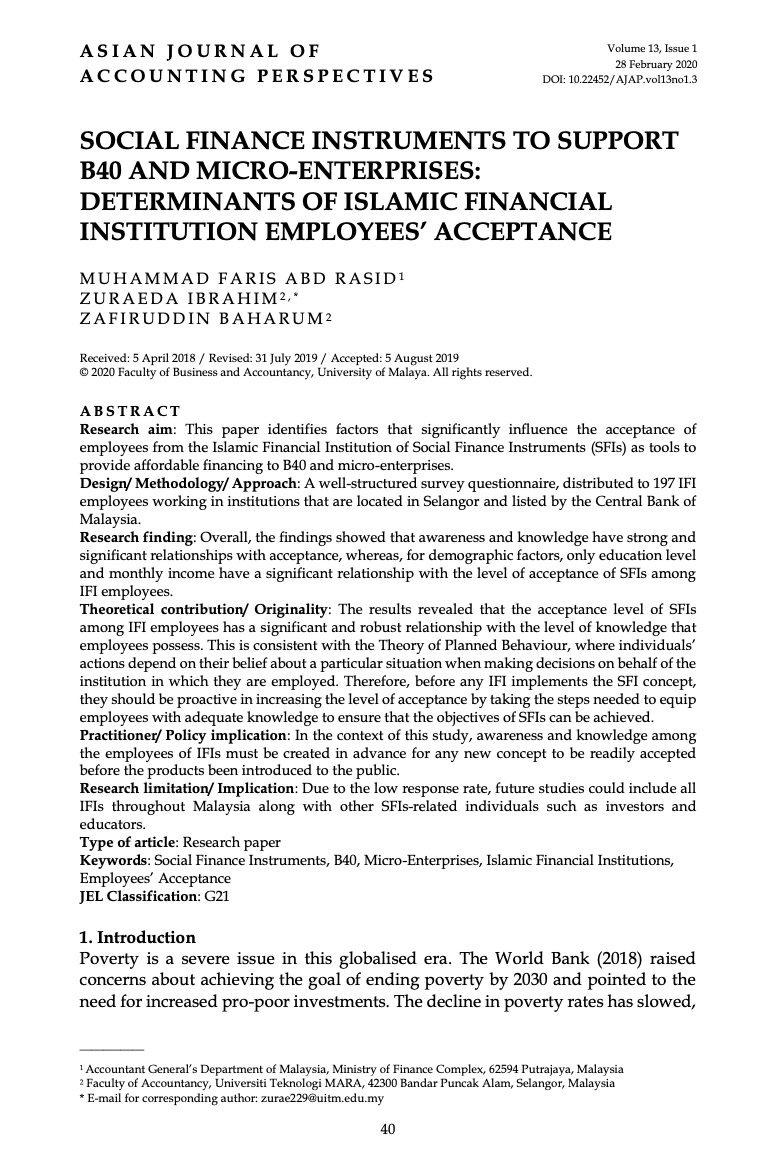Social Finance Instruments to Support B40 and Micro-Enterprises: Determinants of Islamic Financial Institution Employees’ Acceptance
Main Article Content
Abstract
Research aim: This paper identifies factors that significantly influence the acceptance of employees from the Islamic Financial Institution of Social Finance Instruments (SFIs) as tools to provide affordable financing to B40 and micro-enterprises.
Design/ Methodology/ Approach: A well-structured survey questionnaire, distributed to 197 IFI employees working in institutions that are located in Selangor and listed by the Central Bank of Malaysia.
Research finding: Overall, the findings showed that awareness and knowledge have strong and significant relationships with acceptance, whereas, for demographic factors, only education level and monthly income have a significant relationship with the level of acceptance of SFIs among IFI employees.
Theoretical contribution/ Originality: The results revealed that the acceptance level of SFIs among IFI employees has a significant and robust relationship with the level of knowledge that employees possess. This is consistent with the Theory of Planned Behaviour, where individuals’ actions depend on their belief about a particular situation when making decisions on behalf of the institution in which they are employed. Therefore, before any IFI implements the SFI concept, they should be proactive in increasing the level of acceptance by taking the steps needed to equip employees with adequate knowledge to ensure that the objectives of SFIs can be achieved.
Practitioner/ Policy implication: In the context of this study, awareness and knowledge among the employees of IFIs must be created in advance for any new concept to be readily accepted before the products been introduced to the public.
Research limitation/ Implication: Due to the low response rate, future studies could include all IFIs throughout Malaysia along with other SFIs-related individuals such as investors and educators.
Type of article: Research paper
Keywords: Social Finance Instruments, B40, Micro-Enterprises, Islamic Financial Institutions, Employees’ Acceptance
JEL Classification: G21
Downloads
Article Details
License
The Asian Journal of Accounting Perspectives (AJAP) articles are published under a licence equivalent to the Creative Commons Attribution-NonCommercial-NoDerivs License (CC BY-NC-ND). The licence allows users to copy, distribute, and transmit an article as long as the author is attributed. The article is not used for commercial purposes. The work is not modified or adapted in any way.
Copyright
Authors are required to sign the Exclusive License to Publish agreement upon publication in the AJAP. The agreement grants the Publisher (Faculty of Business and Accountancy, Universiti Malaya) to publish and disseminate the articles.
Open Access
Articles published in the AJAP are digital, online, free of charge, and free of most copyright and licensing restrictions.
Article Processing Charge
Articles publish in AJAP is free submission, production and publication charges. However, all accepted articles are required for language editing. The AJAP officially appointed and outsourced proofreader will conduct this process, and the authors will cover the cost. AJAP does not profit from this process and transaction.
References
Ahmad, S.Z. (2012). Micro, small and medium‐sized enterprises development in the Kingdom of Saudi Arabia. World Journal of Entrepreneurship, Management and Sustainable Development, 8(4), 217–232. https://doi.org/10.1108/20425961211276606
Al-sultan, W. (1999). Financial characteristics of interest-free banks and conventional banks. University of Wollongong Research Online, 1–241. Retrieved from https://ro.uow.edu.au/theses/1019
Alessia, G., & Boiardi, P. (2017). Financing for social impact: The key role of tailored financing and hybrid finance. Retrieved from https://evpa.eu.com/
Aziz, N.M., & Mohamad, O.B. (2016). Islamic social business to alleviate poverty and social inequality. International Journal of Social Economics, 43(6), 573–592. https://doi.org/10.1108/IJSE-06-2014-0129
Bank Islam Malaysia Berhad (BIMB). (2017). Bank Islam Malaysia Berhad Annual Report 2017, 147. Retrieved from http://www.tigerbrands-online.co.za/
Bank Negara Malaysia. (2018a). Islamic Bank in Malaysia. Retrieved from http://www.bnm.gov.my/
Bank Negara Malaysia. (2018b). Value-Based Intermediation: Strengthening the roles and impact of Islamic Finance, (March). Retrieved from https://www.bnm.gov.my/
Benedikter, R. (2011). Social Banking and Social Finance-Answers to the Economic Crisis. New York, NY: Springer.
Cheah, I., & Phau, I. (2011). Attitudes towards environmentally friendly products: The influence of ecoliteracy, interpersonal influence and value orientation. Marketing Intelligence and Planning, 29(5), 452–472. https://doi.org/10.1108/02634501111153674
Choy, L.T. (2014). The Strengths and Weaknesses of Research Methodology: Comparison and Complimentary between Qualitative and Quantitative Approaches. Journal of Humanities and Social Science, 19(4), 99–104. https://doi.org/10.9790/0837-194399104
D’Ortenzio, C. (2012). Understanding Change and Change Management Processes: A Case Study. (Doctoral Thesis). University of Canberra Canberra, Australia.
Department of Statistics Malaysia. (2017). Department of Statistics Malaysia Press Release Report of Household Income and Basic Amenities Survey 2016. Report of Household Income and Basic Amenities Survey 2016. https://doi.org/1.1017/CBO9781107415324.004
Department of Statistics Malaysia. (2018a). Consumer Price Index (CPI). Indeks Harga Pengguna.
Department of Statistics Malaysia. (2018b). Demographic Statistics Second Quarter (Q2), 2018, Malaysia.
Department of Statistics Malaysia. (2018c). Department of Statistics Malaysia Press Release.
Economic Planning Unit. (2016). Incidence Poverty Ethnic Group Strata and State of Malaysia in 1970 to 2016. Retrieved from http://www.epu.gov.my/
Fianto, B.A., Gan, C., Hu, B., & Roudaki, J. (2017). Equity financing and debt-based financing: Evidence from Islamic microfinance institutions in Indonesia. Pacific Basin Finance Journal, 52, 163-172. https://doi.org/10.1016/j.pacfin.2017.09.010
Gait, A.H., & Worthington, A.C. (2007). A Primer on Islamic Finance: Definitions, Sources, Principles and Methods. Faculty of Business, Accounting & Finance. University of Wollongong, Working Papers in Accounting and Finance, No. 07/05. Retrieved from https://ro.uow.edu.au/accfinwp/5
Gait, A., & Worthington, A. (2008). An empirical survey of individual consumer, business firm and financial institution attitudes towards Islamic methods of finance. International Journal of Social Economics, 35(11), 783–808. https://doi.org/ 10.1108/03068290810905423
Global Impact Investing Network. (2018). Annual impact investor survey 2017: The seventh edition. The Global Impact Investing Network (GIIN). Retrieved from https://thegiin.org/
Haneef, M.A., Pramanik, A.H., Mohammed, M.O., Dahiru, A., & Amin, F. (2013). Integration of Waqf and Islamic Microfinance for Poverty Reduction: A Survey in Kuala Selangor, Malaysia. Journal of Islamic Finance, 2(2), 1–16. Retrieved from https://journals.iium.edu.my/iiibf-journal/index.php/jif/article/view/16
Hassan, A. (2014). The challenge in poverty alleviation: Role of Islamic microfinance and social capital. Humanomics, 30(1), 76–9. https://doi.org/10.1108/H-10-2013-0068
Hill, R. (1998). What sample size is “ENOUGH” in internet survey research. Interpersonal Computing and Technology: An Electronic Journal for the 21st Century, 6, 3–4.
Jaffar, M.A., & Musa, R. (2016). Determinants of Attitude and Intention towards Islamic Financing Adoption among Non-Users. Procedia Economics and Finance, 37(16), 227–233. https://doi.org/10.1016/S2212-5671(16)30118-6
Jones, J.F. (2010). Social finance: Commerce and community in developing countries. International Journal of Social Economics, 37(6), 415–428. https://doi.org/10.1108/03068291011042300
Khan, A.A., Tahmazov, I., & Abuarqub, M. (2009). Translating Faith into Development. Birmingham, UK: Islamic Relief Worldwide. Retrieved from http://chede.org/
Linder, F., & Wald, A. (2011). Success factors of knowledge management in temporary organizations. International Journal of Project Management, 29(7), 877–888. https://doi.org/10.1016/j.ijproman.2010.09.003
McCannon, B.C. (2014). Finance education and social preferences: Experimental evidence. Journal of Behavioral and Experimental Finance, 4, 57–62. https://doi.org/10.1016/j.jbef.2014.10.001
Milfont, T.L., & Gouveia, V.V. (2006). Time perspective and values: An exploratory study of their relations to environmental attitudes. Journal of Environmental Psychology, 26(1), 72–82. https://doi.org/10.1016/j.jenvp.2006.03.001
Montargot, N., & Lahouel, B.B. (2018). The acceptance of technological change in the hospitality industry from the perspective of front-line employees. Journal of Organizational Change Management, 31(3), 637–655. https://doi.org/10.1108/JOCM-10-2016-0192
Muda, I., Rafiki, A., & Harahap, M.R. (2014). Factors Influencing Employees’ Performance: A Study on the Islamic Banks in Islamic Science University of Malaysia University of North Sumatera. International Journal of Business and Social Science, 5(2), 73–81. Retrieved from https://ijbssnet.com/journal/index/2360
Mustapa, W.N.W., Mamun, A.A., & Ibrahim, M.D. (2018). Economic Impact of Development Initiatives on Low-Income Households in Kelantan, Malaysia. Social Sciences, 7(7), 1-17. https://doi.org/10.3390/socsci7070118
Oseni, U.A., Adewale, A., & Zain, N.R.B.M (2016). Customers’ perceptions on the dispute resolution clauses in Islamic finance contracts in Malaysia. Review of Financial Economics, 31, 89–98. https://doi.org/10.1016/j.rfe.2016.05.004
Ostrom, A.L., Bitner, M.J., Brown, S.W., Burkhard, K.A., Goul, M., Smith-Daniels, V., & Rabinovich, E. (2010). Moving forward and making a difference: Research priorities for the science of service. Journal of Service Research, 13(1), 4–36. Retrieved from https://doi.org/10.1177/1094670509357611
Paetzold, F., Busch, T., & Chesney, M. (2015). More than money: exploring the role of investment advisors for sustainable investing. Annals in Social Responsibility, 1(1), 195–223. https://doi.org/10.1108/ASR-12-2014-0002
Pallant, J. (2011). SPSS Survival Manual: A step by step guide to data analysis using SPSS (4th Ed.). Milton Keynes, UK: Open University Press
Park, N., Rhoads, M., Hou, J., Lee, K.M. (2014). Understanding the acceptance of teleconferencing systems among employees: An extension of the technology acceptance model. Computers in Human Behavior, 39, 118-127. https://doi.org/10.1016/j.chb.2014.05.048
Perren, L. (2000). Factors in the growth of micro-enterprises (Part 2): exploring the implications. Journal of Small Business and Enterprise Development, 7(1), 58–68. https://doi.org/10.1108/EUM0000000006805
Radun, I., Nilsonne, G., Radun, J., Helgesson, G., & Kecklund, G. (2019). Company employees as experimental participants in traffic safety research: Prevalence and implications. Transportation Research Part F: Traffic Psychology and Behaviour, 60, 81–92. https://doi.org/10.1016/j.trf.2018.10.008
Razinah, N., Zain, M., & Adawiah, E.R. (2017). An Analysis on Islamic Social Finance for Protection and Preservation of An Analysis on Islamic Social Finance for Protection and Preservation of Maqāṣ id al- Sharī‘ah. Journal of Islamic Finance, (January 2018), 133–141. https://doi.org/1.12816/0047345
Rizzi, F., Pellegrini, C., & Battaglia, M. (2018). The structuring of social finance: Emerging approaches for supporting environmentally and socially impactful projects. Journal of Cleaner Production, 170, 805–817. https://doi.org/10.1016/j.jclepro.2017.09.167
Roose, N., & Bishnoi, K. (2012). The Sovereign Wealth Fund Initiative Fall 2012 Defining an Ecosystem for Social Finance. The Fletcher School Tufts University. Retrieved from https://sites.tufts.edu/
Samad, M.A. (2014). Islamic micro finance: Tool for economic stability and social change. Humanomics, 30(3), 199–226. https://doi.org/10.1108/H-12-2013-0085
Scharrer, B. (2015). Employees’ Acceptance and Involvement in Accordance with Codes of Conduct – Chinese Business Behaviour vs. Western Compliance Management Systems. Procedia Social and Behavioral Sciences, 213, 855–859. https://doi.org/ 10.1016/j.sbspro.2015.11.495
Sekaran, U., & Bougie, R. (2016). Research Methods for Business (7th Ed.). United Kingdom: John Wiley & Sons Ltd.
Shaikh, S.A. (2017). Poverty alleviation through financing microenterprises with equity finance. Journal of Islamic Accounting and Business Research, 8(1), 87–99. https://doi.org/10.1108/JIABR-07-2013-0022
Shaikh, S.A., Ismail, A.G., & Shafiai, M.H.M. (2017). Application of waqf for social and development finance. ISRA International Journal of Islamic Finance, 9(1), 5–14. https://doi.org/10.1108/IJIF-07-2017-002
Sherif, M., & Shaairi, N.A. (2013). Determinants of demand on family Takaful in Malaysia. Journal of Islamic Accounting and Business Research, 4(1), 26–50. https://doi.org/10.1108/17590811311314276
Social Finance Organization in United Kingdom. (2017). Acknowledgement. Retrieved from https://www.socialfinance.org.uk/
Tayal, R., Upadhya, R.K., Yadav, M., Rangnekar, S., & Singh, R. (2018). The impact of transformational leadership on employees’ creativity. Management Research Review, 41(1), 113–132. https://doi.org/10.1108/JABS-03-2014-0022
Thaker, M.A. (2018). A qualitative inquiry into cash waqf model as a source of financing for micro enterprises. ISRA International Journal of Islamic Finance, 10(1), 19–35. https://doi.org/10.1108/IJIF-07-2017-0013
World Bank. (2016). The World Bank Annual Report 2016. Retrieved from http://documents.worldbank.org/
World Bank. (2017). End Extreme Poverty, Boost Shared Prosperity: The World Bank Annual Report 2017. Retrieved from https://openknowledge.worldbank.org/
World Bank. (2018). Decline of Global Extreme Poverty Continues but Has Slowed: World Bank. Retrieved from http://www.worldbank.org/
Zain, N.R.M., & Ali, E.R.A.E. (2017). An Analysis on Islamic Social Finance for Protection and Preservation of Maqāṣ id al-Sharī‘ah. Journal of Islamic Finance IIUM Institute of Islamic Banking and Finance, 6, 133–141. Retrieved from https://journals.iium.edu.my/iiibf-journal/index.php/jif/article/view/262
Ziyaad, M. (2017). The Islamic Social Finance & Investment Imperative. Centre for Islamic Asset and Wealth Management, 29–31. Retrieved from http://www.inceif.org/

